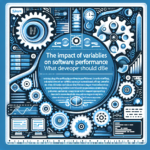
Introduction
In today’s data-driven world, the quest for success hinges on the ability to analyze and interpret data effectively. The cornerstone of any analytical endeavor lies in the relationship between independent and dependent variables, particularly the latter. Measuring Success: The Critical Role of Dependent Variables in Data Analysis unfolds a tapestry of insights that will deepen your understanding of how dependent variables shape the outcomes of data studies. As we traverse this landscape, we will uncover the essential role these variables play in determining not just the effectiveness of strategies, but the very definition of success itself.
Why Should You Care About Dependent Variables?
Imagine running a marketing campaign without a clear understanding of what constitutes ‘success.’ Without measuring the right dependent variables—like conversion rates, customer engagement, or ROI—you risk navigating through a fog of uncertainty. In precision-driven fields such as healthcare, education, and business, understanding these dependent variables can be the difference between success and failure. This article offers a comprehensive look at how prioritizing dependent variables can lead you to informed decisions, actionable insights, and ultimately, sustained success.
Understanding Dependent Variables
What Are Dependent Variables?
At its core, a dependent variable is the outcome factor that researchers are interested in measuring. It "depends" on the manipulation of one or more independent variables. For instance, in a study examining the effects of study habits on student academic performance, the dependent variable would be academic performance, while the independent variable could be hours spent studying.
The Importance of Context
The role of dependent variables is not merely foundational; it’s contextual. Their relevance can shift dramatically based on research design and objectives. In a business context, is customer satisfaction the dependent variable when assessing the effectiveness of a new product? Or is it sales figures? Understanding this distinction is paramount.
Case Studies in Measuring Success with Dependent Variables
Case Study 1: Marketing Campaign Analytics
Analysis
A renowned company decided to assess the efficacy of a new marketing campaign. The dependent variable in this context was the number of products sold. By analyzing the unique visitors to their website (independent variable), they were able to draw strong correlations between online traffic and sales figures.
| Metric | Value |
|---|---|
| Website Visitors | 100,000 |
| Products Sold | 5,000 |
| Conversion Rate | 5% |
Key Takeaways
This case highlights how Measuring Success: The Critical Role of Dependent Variables in Data Analysis can guide marketing strategies. By effectively identifying dependent variables, marketers can tailor their efforts to optimize campaigns for greater sales.
Case Study 2: Healthcare Outcomes
Analysis
In a clinical trial, researchers sought to determine the effectiveness of a new diabetes medication. Here, the dependent variable was the patients’ blood glucose levels. By manipulating the independent variable—dosage of the medication—they could quantify improvements in health.
| Dosage (mg) | Average Glucose Level (mg/dL) |
|---|---|
| 0 | 180 |
| 50 | 140 |
| 100 | 110 |
Key Takeaways
This study illustrates the profound implications of understanding dependent variables. Successful outcomes lead to not just academic satisfaction, but potential approval for life-saving medications.
Utilizing Statistical Analysis
Common Statistical Methods for Analyzing Dependent Variables
Regression Analysis
A statistical method to determine the relationship between independent and dependent variables. It is crucial in quantifying success metrics.ANOVA (Analysis of Variance)
Helps in understanding differences among group means in a sample.- t-Tests
Useful for comparing the means between two groups regarding a dependent variable.
The Role of Data Visualization
Visualization tools can dramatically enhance understanding. Graphs and charts can showcase trends and relationships, simplifying complex data into digestible insights, essential in Measuring Success: The Critical Role of Dependent Variables in Data Analysis.
| Year | Sales ($) | Marketing Spend ($) |
|---|---|---|
| 2020 | 200k | 50k |
| 2021 | 300k | 70k |
| 2022 | 400k | 80k |
This table illustrates how sales increase over time concerning marketing spend—highlighting the dependent variable’s role in driving marketing strategies.
The Pitfalls of Neglecting Dependent Variables
Misguided Strategies
Ignoring the importance of dependent variables can lead to misguided strategies. A case in point was a famous tech firm that heavily invested in product development, but failed to analyze customer satisfaction as a core dependent variable. The result? A well-engineered product flopped in the market despite its technical brilliance.
A Call for Rigor
To avoid such pitfalls, organizations must rigorously define their dependent variables. This involves conducting exploratory data analyses and engaging in thoughtful discussions about what ‘success’ truly entails for them.
Motivating Factors in Measuring Success
Setting Clear Objectives
Understanding dependent variables encourages teams to establish clear, quantifiable objectives. Whether in sales, education, or healthcare, defining success through measurable outcomes can spell the difference between aimless efforts and focused results.
Continuous Improvement
Measuring and analyzing dependent variables is not a one-time task but an ongoing process. It should evolve with changing contexts, customer needs, and technological advancements.
Conclusion
In the fast-paced world of data analytics, Measuring Success: The Critical Role of Dependent Variables in Data Analysis emerges as a vital area of focus. Whether you’re a business leader, healthcare professional, or educator, understanding and prioritizing dependent variables can illuminate your path toward success.
By embracing data analysis with an emphasis on dependent variables, you not only enhance your strategic insights but also pave the way for informed, impactful decisions. As you continue to harness the power of data, remember—success is not just about the numbers; it’s about the story those numbers tell.
FAQs
1. What is a dependent variable?
A dependent variable is the outcome or effect that researchers measure in an experiment, which depends on one or more independent variables.
2. Why are dependent variables important in data analysis?
They provide measurable outcomes, allowing for the assessment of effects and effectiveness of different strategies or interventions.
3. How do you choose the right dependent variable for analysis?
Choosing the right dependent variable depends on the goals of your research. It should align with what you want to measure and understand about the phenomenon you are studying.
4. Can you provide an example of a dependent variable in business?
Certainly! In a sales strategy analysis, the number of units sold can serve as a dependent variable, while marketing spend or advertising reach can be the independent variables.
5. How can I improve my analysis of dependent variables?
To improve your analysis of dependent variables, ensure you are using the correct statistical methods, continuously refine your approach based on emerging data, and leverage data visualization tools to clarify insights.
By understanding and implementing the insights from this article, you can take meaningful steps toward harnessing the transformative power of data in your success journey.















